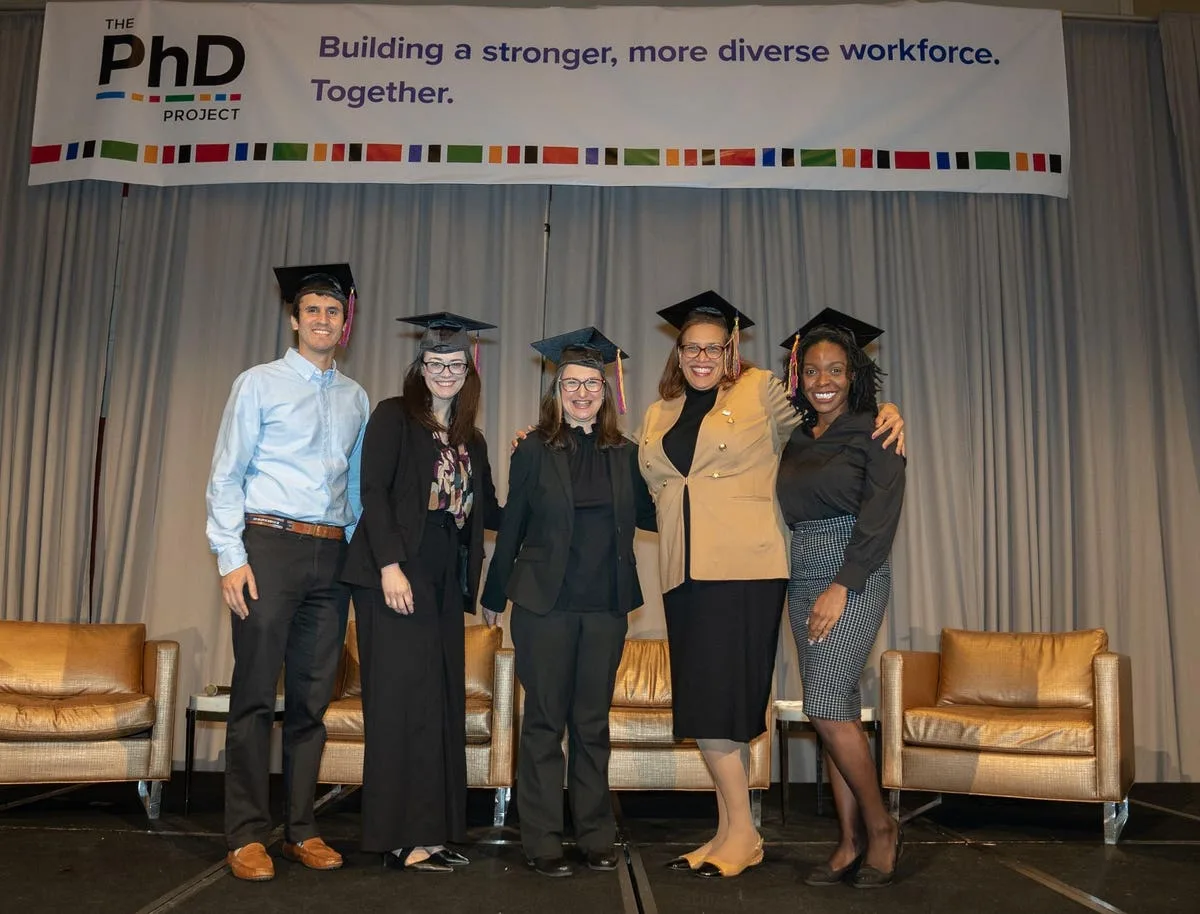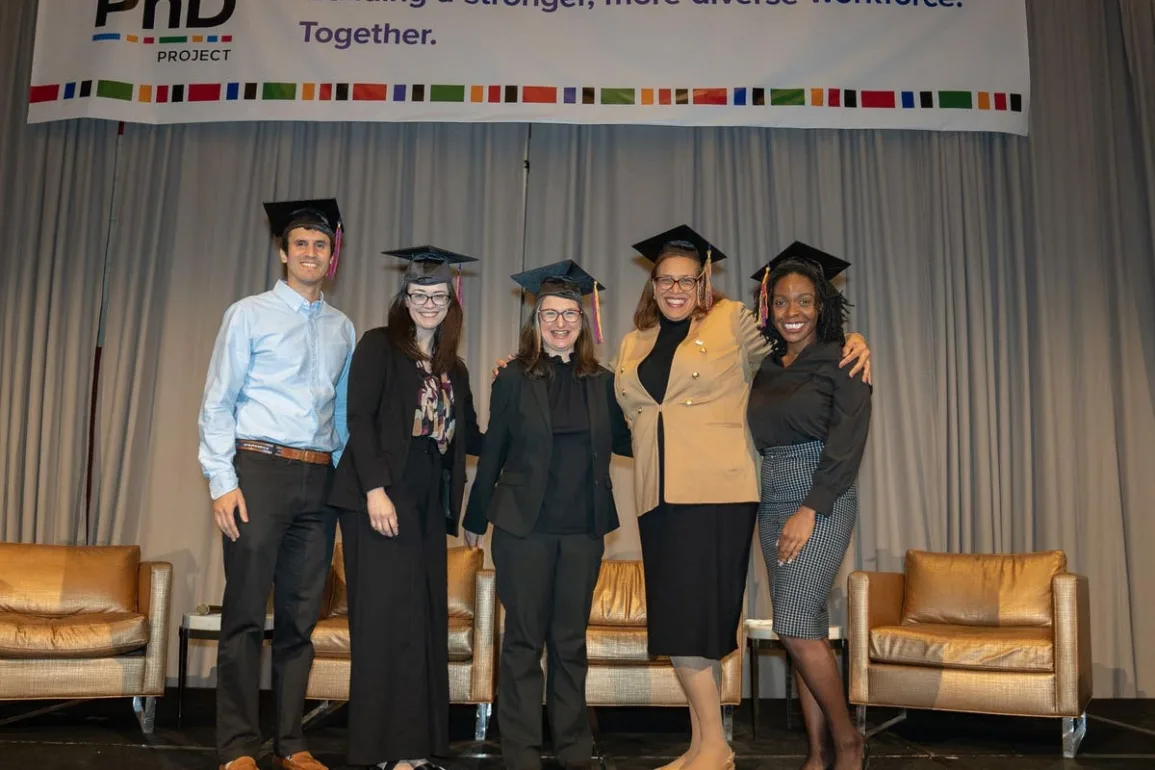
According to a report from the Association to Advance Collegiate Schools of Business, the undergraduate population of business school students is 37% students of color. Moreover, 32% of MBA students are students of color, and 35% of doctoral students in business are students of color. However, only 26% of full-time business school faculty are people of color (19% Asian American, 3.9% Black, 2.8% Hispanic, and .3% Native American). In order to increase the presence of faculty of color in business schools, The PhD Project provides opportunities for students of color who are often overlooked and underserved.
Blane Ruschak speaking at The PhD Project Conference.
Founded in 1994, The PhD Project works to increase diversity in the business world with a longitudinal approach. The organization’s members pursue business Ph.D.s with the intent to become faculty, teaching and guiding underrepresented students who aspire to a career in business.
The PhD Project is also focused on fueling creativity and innovation in the professoriate and in business schools. To do this, the organization believes it is important to first diversify business school faculty. According to Blane Ruschak, president of the Ph.D. Project, “In 1994, we looked at business education, and the faculty-base was woefully underrepresented, when it comes to Black/African American, Latinx/Hispanic American and Native American business professors.” To try to remedy the situation, the organization started to hold an invitation-only conference in Chicago each year for those considering business doctoral studies. All expenses are covered and at that conference, participants find out what a PhD is and how it can improve one’s like. About 300 people are invited to attend the conference every year, of which about 50 enter a business Ph.D. program. Once enrolled in a business doctoral program, eligible students become members of a Doctoral Student Association (DSA) in accounting, finance & economics, information systems, management or marketing. The DSA provides resources, support and networking opportunities to doctoral students throughout their studies.
The Ph.D. Project has had considerable success with the DSA program. For example, 90% of The PhD Project doctoral students complete their degrees and 97% accept a faculty position upon graduation. According to Ruschak, “Our end goal is to get more historically underrepresented and marginalized students to want to seek business as a career. You must have diversity in front of the classroom to have diversity in the classroom and, ultimately, in the business world.”
Increasing diversity in the faculty has a positive impact on the diversity of an institution’s student body as well. The PhD Project inspires successful people in business to leave their corporate jobs to earn a PhD. They become a professor in the classroom and acts as a role model to students. According to Ruschak, “For nearly 30 years, our members have not just become professors; we have been department chairs, deans, provosts and even university presidents. Since its launch, The PhD Project has been responsible for sextupling the number of underrepresented professors, administrators and academic leaders at an extensive list of academic programs.” Through its work, The PhD Project has helped more than 1,400 former business professionals and undergraduate students earn their doctoral degrees. As these individuals become professionals and share their stories, they have an impact on more students of color deciding their next steps in life, including higher education.
The PhD Project’s work is highly important to business schools, which regularly struggle to diversify their faculty and their Ph.D. program due to limiting definitions of quality, and lack of pro-active recruitment efforts. According to researchers Sonya Grier and Sonja Martin Poole, “If a business school is serious and sincere about faculty racial diversity, it is imperative to have clear, explicit open discussions surrounding what diversity means, why it is important, and who is included to move beyond broad statements on and erroneous understandings of diversity in the search process and beyond.”
Preliminary data show that The Ph.D. Project’s initiatives have significantly increased degree completion rates for underrepresented students of color. By effectively enhancing underrepresented faculty representation, the PhD Project plays a vital role in fostering student success and promoting diversity, equity, and inclusion (DEI) in business schools. According to Ruschak, “Current research insights from PhD Project faculty offer valuable guidance for institutions seeking to implement targeted DEI strategies that harness the power of faculty diversity to boost academic achievement for all students.”
The PhD Project is also addressing the recent issue of affirmative action being struck down in college admissions. Ruschak shared, “We were deeply disheartened by the Supreme Court’s decision. Too often, the student population at U.S. higher education institutions fails to reflect the demographic realities of our country. Very real barriers still exist for historically marginalized and minority students striving to further their education. Our work is to eliminate those barriers continues.” He added, “We remain fully committed to making a societal impact by increasing diversity in front of business school classrooms to attract a more diverse student population so that the business world will reflect the customer base it serves.”


